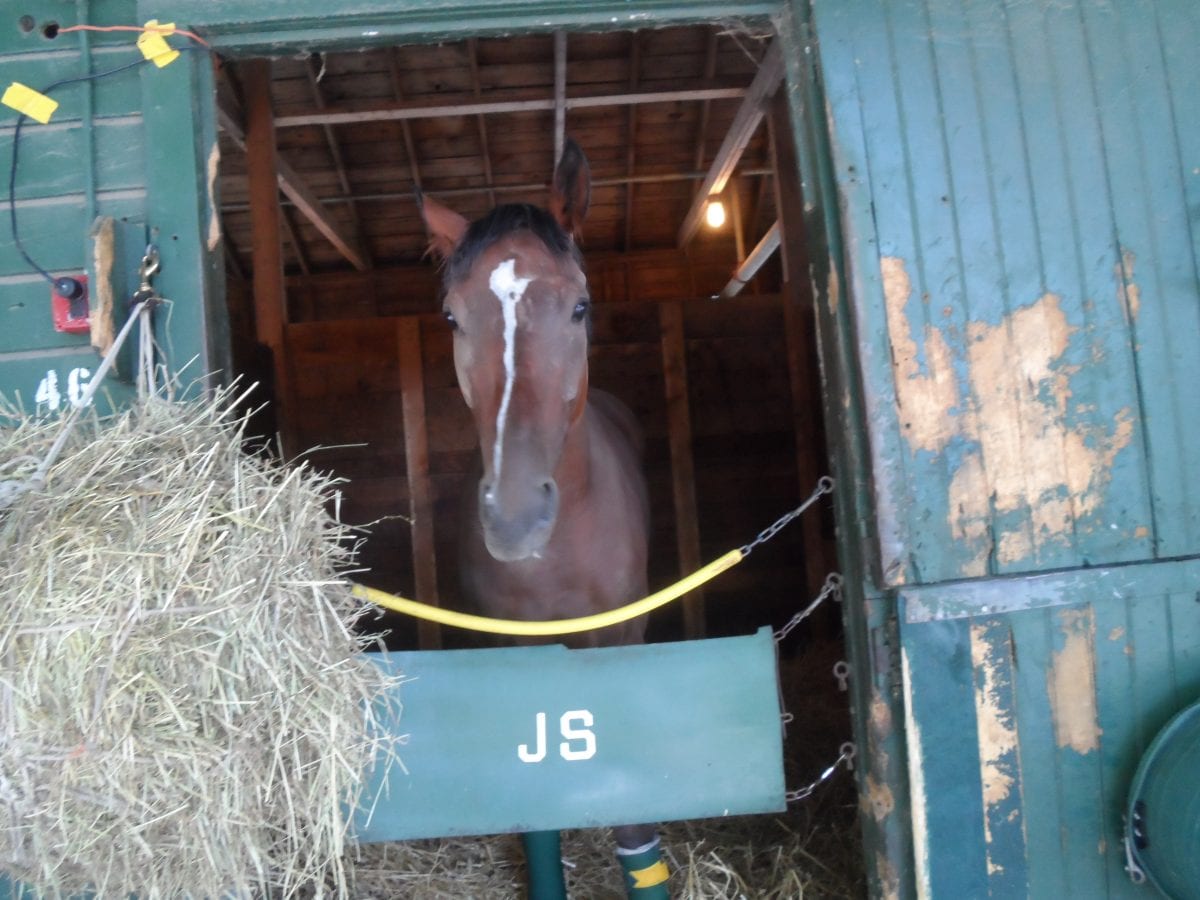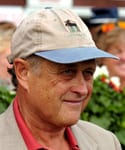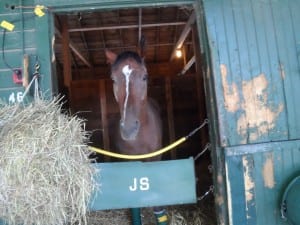This is the second in our series of Saratoga “Spa Diaries” for The Racing Biz, as we check in with various Mid-Atlantic horsemen and women who are spending the meet at the Spa.
by Teresa Genaro
When you think about super-trainers, you might think Todd Pletcher. You might think Chad Brown. You might think Bob Baffert.
You probably wouldn’t think Jonathan Sheppard.
 But get the Pennsylvania-based trainer talked about his racing operation, and you might change your mind.
But get the Pennsylvania-based trainer talked about his racing operation, and you might change your mind.
His horses ensconced in their summer digs just to the north of the Oklahoma training track in Saratoga Springs, Sheppard has already made three trips back to the Mid-Atlantic to check on his horses there since he arrived here on July 16. He’s got horses at the 75-acre farm that he owns, complete with a 60-stall barn and a training track; on the 300 nearby acres that he leases; at Delaware Park; and in South Carolina. In the winter, he’s based in Florida.
With 130 horses in training, plus broodmares and babies, he admits that the travel and the logistics can be “stressful.”
“I’d like to quit altogether…some days,” he said. “Some days it’s fine.”
“If you get a win,” he added.
He had one of those fine days on July 26, when five-year-old Razzle Jazil won the sixth race, sending his trainer to the winner’s circle at Saratoga for the 46th consecutive year.
“It is a bit of a load off one’s back,” he said of keeping the record intact, “because you never know. There are a lot of uncertainties; I was at Gulfstream Park for four months and we won one race.
“It could happen here.”
If the “it” is going winless, theoretically, it could…but it hasn’t since 1967.
The win came during one of Sheppard’s trips out of town, and he admitted that he didn’t think that Razzle Jazil, owned by Dr. Jim Hill’s Lake Lonely Racing, would be the horse that would let him shrug off the pressure, so early in the meet. Razzle Jazil is a son of 2006 Belmont Stakes winner Jazil, whose half-sister, Rags to Riches, won the Belmont the very next year. Razzle Jazil got his Saratoga win going—wait for it—a mile and a half. Like father, like aunt, like son.
“You try to pick your spots the best you can, and I thought it might be fun to give him a run up here because Dr. Hill and his wife have a house up here on Lake Lonely,” Sheppard said. “When I spotted this mile and a half race, he’d just won for $20,000 claiming down at Delaware. He has some bad legs, so he ran only twice last year and hadn’t run since last June until this spring.
“I figured, ‘Well, he’s had a long layoff and he’s got a funny-looking ankle, we should run him a little cheap and take a chance,’ and he won, but it was only going a mile. This was moving up from $20,000 claiming in Delaware to $35,000 claiming in New York, but on the plus side was the fact that it was a mile and a half. I figured he would love that.”
Adding to the everyday stress of running a big stable in multiple locations was the news that emerged last week about two of his horses testing positive for Robaxin, a muscle relaxant. Talking just minutes after his phone hearing with the Delaware Thoroughbred Racing Commission, Sheppard was both frustrated and resigned.
“They’ve started with a new lab and have had all kinds of problems,” he said. “Two machines have broken down, two senior technicians have quit, they’re months behind getting the tests through.”
He’s also mystified by how the medication got into his horses, but he knows from past experience that accidents happen in barns. Sheppard has few violations on his record and talks frankly about them, acknowledging that in one case in the past, medication was given to the wrong horse. In another, a feed tub was left in a stall and a horse placed there temporarily on raceday licked the remnants of grain that had medication mixed in with it.
He has not yet determined what led to these recent positives.
“I don’t know what to make of it,” he said. “But whatever happens, happens.”
One of the horses that tested positive—the uncomfortably aptly named Another Surprise—belonged to and was bred by Sheppard, one of the several dozen that he owns alone or in partnership. Still, despite the numbers and the vast facilities, he has a hard time seeing himself as the head of a racing empire.
“I don’t have a lot of big stakes horses and I don’t churn out hundreds of winners every year in claiming races,” he said, adding with a laugh, “I’m just an in-between type of a guy.”
An in-between type of guy who’s won two Breeders’ Cup races; trained multiple champions on the flat and over jumps; earned nearly $80 million in purses; saddled more than 3,000 winners; and was inducted into the Hall of Fame in 1990.
Sheppard was sitting in the modest Saratoga house he purchased some years ago, a two-minute drive from his barn. On the tables, on the walls, on the bookshelves are winner’s circle pictures and other reminders of his decades of success, success that he neither expected nor sought.
“I had sort of a vague, long-range goal of just training my own horses,” he said. “Of course I realized that’s totally impractical financially. It’s not exactly what I planned, and I don’t think of it like ‘an empire,’ but when someone brings it up, I say, well, it is rather amazing, actually.”
The stress of the phone hearing seemed to have abated a bit, and a Tuesday afternoon without racing stretched in front of him. No doubt Sheppard was planning his next trip; in the next week he’d have 12 horses running at five different tracks. Yet he envisions a future that might not involve quite so many horses and people to manage.
“I’d like to feel that there would be an opportunity to have a few years for yourself when it’s all over,” he said, “before it’s too late.”
Has what began as something he loved simply turned into work?
“Not really,” he said. “Only when things get a bit overwhelming. I don’t really consider it work.”
Then he added, with a wry, self-aware smile, “Particularly because it’s what I’d be doing if I were on vacation, probably.”











Great story Teresa,
Thank you! I have the utmost respect for Sheppard. I like the way he trains and manages his horses. If money were no option I believe I would have him or Michael Matz as my trainers, these guys are true horsemen and put the horse first.